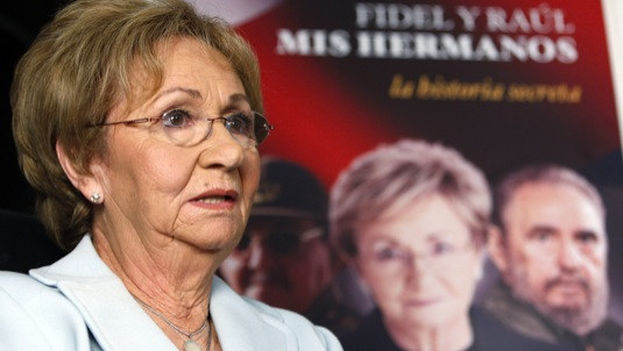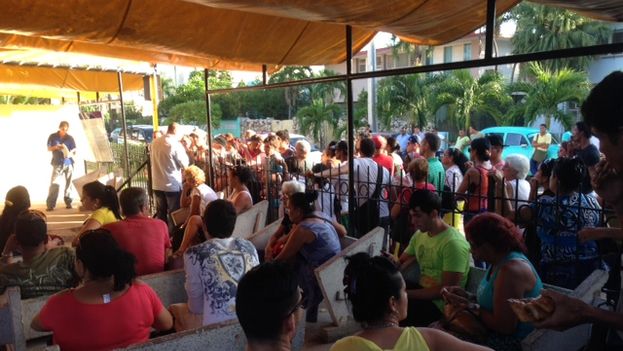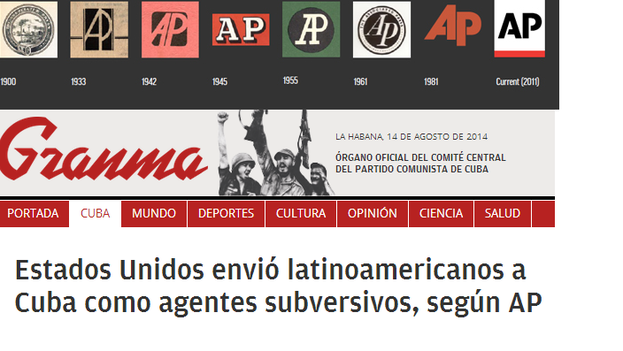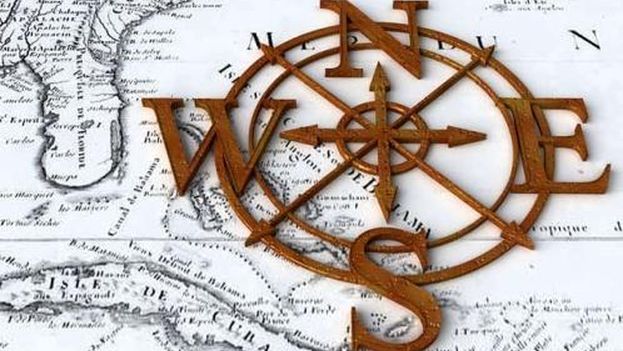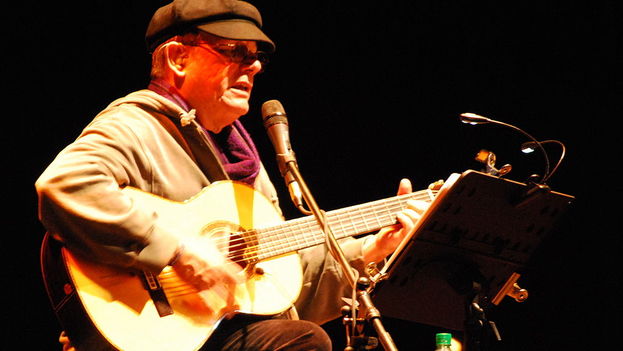14YMEDIO, Francis Sanchez, Ciego de Avila, 18 August 2014 – The anecdotes, the identities and the composition of the family of the Cuban Revolution’s Maximum Leaders, after become a taboo subject due to steps taken by themselves, has become the subject of public interest and a source of constant speculation. A delicate area, the private and mythical environment of the Castro Ruz brothers acquires historical content from rumors, with unnamed girlfriends, faceless wives, children and many family members rarely seen together even in photos.
And in this “complete photo of the first family,” that was never taken and probably never will be, is the disturbing “presence” of an odd woman who carries the same last names with pride, defending the family lineage, but at the same time rejecting the stamps these names have placed on Cuban history. A strong, secluded, argumentative woman who appears, because of this, doubly cursed.
Her request for political asylum in Mexico City on 29 June 1964 was a bombshell. She started the day with a press conference that had a huge impact: “The person addressing you is Juanita Castro Ruz, sister of the Cuban Prime Minister Fidel Castro.” continue reading
Nearly half a century later, Juanita again comes to the fore with the publication of the book “Fidel and Raul, My Brothers” (Aguilar 2009), with the subtitle “The Secret History, Memoirs of Juanita Castro as told to Maria Antonieta Collins.” The testimony was ready back in 1999, after months of confidential interviews, but ten years passed before the protagonist would agree to the printing.
Recalling her departure from Cuba, she casts aside the possible label of traitor, stating that from the beginning she had felt flagrantly deceived, because from the days of the Moncada attack and the Sierra Maestra front, when Cubans died confronting the Batista dictatorship in order to recover the 1940 Constitution, her brother Fidel always said that he was not a Communist.
Among the new confessions, this time perhaps the most incredible, is that she came to belong the CIA—although she clarifies that she never accepted money—in those difficult days in which, in Havana, she took advantage of the paralyzing influence of her last names, to come to the aid of many whom she sometimes didn’t even know, saving them from a summary trial or getting them out of the country. Her house came to be, according to these memoirs, a refuge and an always full transit center.
Anguish and contradictions abound in a woman who conscientiously confronted a beloved part of her own biological being
But the basic need that has led her to gather together her memoirs, she says, it to tell the truth about her family’s past, her brothers’ childhood, the history of the grandparents, and especially her mother, Lina Ruz, and her father, Angel Castro, on seeing how they have been slandered by historians who in attacking Fidel seek explanations in a supposed dark and cruel family origin, in Biran, a farm ruled over by a supposedly unscrupulous father, one who prospered based on criminal acts.
“I’m sorry to disappoint the pocket historians and the instant psychologists,” she says. Of her father, she opines, “Angel Castro Argiz was a man who cared for others. No one who came to him asking for a favor, asking for help, was refused.” And she is nostalgic for the atmosphere of the little place in the former Oriente province, now converted into a museum: “Biran—where we were like a big family because we all knew each other.”
Anguish and contradictions abound in a woman who conscientiously confronted a beloved part of her own biological being, her family and her country. Someone who has not lost, for example, her affection for her youngest brother, Raul. “Musito” to his mother. She favors him, and presents him to us in very human situations, as at the death of their mother, Lina Ruz, crying and inconsolably talking to the beloved body. An image that contrasts with the description of another brother in power.
Her memories leave a sense of transparency. However, this doesn’t mean that the reader should accept everything she describes. Memory is never inoffensive. Even at times when it is just interpretations. And Juanita’s has been a very particular and unique angle on Cuban history, with advantages and disadvantages, precisely for being so close. The most natural—to give one example—is that the memories of the taskmaster Angel’s daughter are more emotional and sweet than a subordinate of his could have, without lying.
She broke with the CIA when they asked her to give a powerful new statement to the press
She broke with the CIA—this is another hot testimony—when they asked her to give a powerful new statement to the press, similar to her request for asylum, but this time with a very different objective: to dispel the fears about the advance of communism. The United States, then, to avoid the danger of a nuclear confrontation, had reached an agreement with the Soviets which demanded the US end its support for anti-communist groups in Miami.
Perhaps Juanita appears more like typical Cuban of whatever shore, and of the island of Cuba itself, when she is shown as vulnerable, unjustly attacked, manipulated and, ultimately, in the midst of the waves and the storms, alone: “In this fight we are all pawns in a game of chess,” she affirms.
She has a very Cuban gesture of feeling herself the most miserable in the world. And on this point, it is appropriate to concede to her the sad merit of being a symbol of the pain and intolerance that divides Cuban families. “No doubt I have suffered more than the rest of the exile because on no side of the Florida Straits am I offered a truce, and few understand the paradox of my life.”
Expressed by her, it is no less pathetic and we see the opinion that “hatred has always prevailed over our reason.”
Luckily, toward the end of the book she invokes the future, allowing the opportunity for love, not prophetically, but with an intimate appeal to the smallest of the seven siblings, her “Musito,” once he has replaced Fidel in power: “Raul, in your hands could be the democratic transition for Cuba… To evolve with dignity could be your great opportunity in history…”
The book of memoirs is written in a pleasant colloquial style, like a good novel of 51 chapters, narrated in the first person. We “hear” the voice of a woman who has lived and stands before everything and everyone with clear and direct style.


